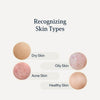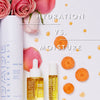Skin Barrier: What is it? How to Protect it?

When it comes to skincare, a term that often floats around is the 'skin barrier.' This essential component of our skin often goes unnoticed until it's compromised. But what exactly is it? And why is it so vital for healthy skin? Let’s dive deep into understanding the intricacies of our skin barrier and its importance in our skincare routines.
What is the Skin Barrier?
At its simplest, the skin barrier, also known as the epidermal barrier or lipid barrier, is the outermost layer of our skin. It functions as a protective shield that prevents the loss of water from the body while barring the entry of harmful external agents like bacteria, allergens, and environmental toxins. Think of it as the protective barrier between you and the outside world.
Composition of the Skin Barrier
The skin barrier can be visualized like a brick wall, where skin cells (keratinocytes) act as the bricks, and lipids (oils) act as the mortar holding them together. This structure ensures that the skin remains hydrated by trapping in water and keeping out harmful substances.
There are 3 components to the skin barrier and all 3 are affected by your guts health, what you eat, and what you put on your skin.
Skin Microbiome
The skin microbiome refers to the community of microorganisms, including bacteria, fungi, viruses, and mites, that reside on the skin's surface. These microorganisms play a vital role in skin health, immune responses, and protection against harmful pathogens. The gut and skin microbiomes are interconnected. An imbalance in gut flora, often referred to as "dysbiosis", can potentially influence skin conditions such as acne, rosacea, and eczema. For instance, an overgrowth of harmful bacteria in the gut can lead to inflammation, which may manifest on the skin.
The Acid Mantle
The acid mantle is a slightly acidic film on the skin's surface, made up of sebum (skin oils) and sweat. This protective layer maintains the skin's pH between 4.5 and 6.2, making it slightly acidic, which helps inhibit the growth of harmful pathogens. A compromised gut can lead to inflammation and may affect the production and composition of sebum, potentially disrupting the acid mantle's pH balance.
The Lipid Barrier
The lipid barrier consists of ceramides, cholesterol, and fatty acids. These "fill the spaces" between skin cells, ensuring skin flexibility and preventing water loss.
Why is a Healthy Skin Barrier Crucial?
Hydration: A robust skin barrier helps retain moisture, keeping the skin soft, plump, and hydrated.
Protection: It acts as the first line of defense against external aggressors, including pollutants, allergens, and harmful UV rays.
Prevention: When functioning optimally, it prevents the development of various skin issues like acne, irritations, and sensitivity.
Signs of a Compromised Skin Barrier
When the skin barrier is damaged, you might notice:
- Increased sensitivity and redness
- Itchy or tight skin
- Flaking or peeling
- Increased breakouts
- Stinging sensation when applying products
Common Culprits That Damage the Skin Barrier
Over Using Exfoliants: Using scrubs, acids, active ingredients (retinoids, benzoyl peroxide, anti-acne medicine) or peels too frequently can strip the skin of its essential oils.
Harsh skincare products: Products with high alcohol content, strong acids, or those that are not pH balanced.
Environmental factors: Pollution, hot water, UV rays, and extreme weather conditions can weaken the barrier.
Over-washing: Washing the face too often or using hot water can strip away natural oils.
How to Strengthen and Repair Your Skin Barrier
The fastest and most efficient way to heal a skin barrier is to immediately stop using products that damage the skin barrier and stick to a consistent, and most importantly gentle skincare routine.
Gentle Face Wash: Opt for a gentle, cream based, hydrating, pH-balanced cleanser that doesn't strip your skin. Avoid over-washing and use lukewarm water.
Moisturize Really Well: Choose a moisturizer with ceramides, fatty acids, and cholesterol, the primary components of the skin barrier. This will help replenish the natural lipid content of your skin.
Sun Protection: Use a broad-spectrum sunscreen daily. UV rays can deteriorate the skin barrier, making it essential to protect your skin even on cloudy days.
Limit Exfoliation: If your skin barrier is compromised, give exfoliation a break. When reintroducing, opt for gentler acids like lactic acid and limit to once or twice a week.
Incorporate Antioxidants: Products with antioxidants, like vitamin C and E, can help combat free radicals from the environment that can weaken the skin barrier.
Avoid Irritants: Fragrances, alcohols, and certain preservatives can be irritating for some people. If you suspect they're compromising your barrier, consider eliminating them from your routine.
Natural Ingredients that help in restoring a damaged skin barrier
Restoring a damaged skin barrier requires ingredients that can replenish lost lipids, enhance skin hydration, calm inflammation, and support the natural healing and regeneration processes of the skin. Several natural ingredients have been recognized for their beneficial properties in aiding skin barrier restoration, but the most important ones that have the most impact to us are: Ceramides, Niacinamide (Vitamin B3), Oils Rich in Essential Fatty Acids (Rosehip or Jojoba), Hyaluronic Acid, Aloe Vera, Honey, Allantoin, Calendula, and more.
A Healthy Diet
What you consume has a direct effect on your skin's health. Foods rich in omega-3 fatty acids like fish, walnuts, and flaxseeds can help reinforce the skin barrier. Similarly, staying hydrated ensures that the skin remains plump and supple.
The Importance of Professional Guidance
If you believe your skin barrier is severely compromised, it's essential to consult a dermatologist. They can offer targeted treatments and product recommendations tailored to your skin's needs.
Maintaining a robust skin barrier is the cornerstone of achieving radiant and healthy skin. By understanding its function and treating it with care, we can ensure our skin looks its best while protecting it from the myriad challenges it faces daily. Remember, skincare isn't just about addressing the surface but understanding and nurturing the foundational aspects, with the skin barrier being paramount among them.










